|
|
|
Sort Order |
|
|
|
Items / Page
|
|
|
|
|
|
|
| Srl | Item |
| 1 |
ID:
103686
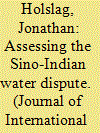

|
|
|
| 2 |
ID:
100483
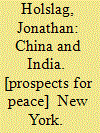

|
|
|
|
|
| Publication |
New York, Columbia University Press, 2010.
|
| Description |
x, 234p.
|
| Standard Number |
9780231150422
|
|
|
|
|
|
|
|
|
|
|
|
Copies: C:1/I:0,R:0,Q:0
Circulation
| Accession# | Call# | Current Location | Status | Policy | Location |
| 055075 | 327.51054/HOL 055075 | Main | On Shelf | General | |
|
|
|
|
| 3 |
ID:
106030
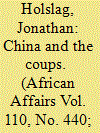

|
|
|
|
|
| Publication |
2011.
|
| Summary/Abstract |
However destabilizing illegitimate regime changes are for Africa, they have not caused China to change its policies. Examining five coups that occurred in Africa between 2003 and 2010, this article argues that China did not see the coups as major threats to its interests, but accepted instability as a part of doing business in Africa. China remained sceptical of democracy as an antidote to instability and deeply distrusted the effort of Western countries to promote liberal political standards. China therefore continued to display conservative self-restraint, a preference for unilateralism, and a pragmatic mercantilist policy intended to strengthen its economic presence. If China is guided by any strategy, it is the strategy of adapting to political realities, rather than trying to shape them.
|
|
|
|
|
|
|
|
|
|
|
|
|
|
|
|
| 4 |
ID:
169193
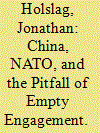

|
|
|
|
|
| Summary/Abstract |
This year, the North Atlantic Treaty Organization (NATO) initiated a strategic reflection about China, with the United States requesting allies to join in its attempt to come to grips with China's growing prowess. Beyond the Pacific, China has staged exercises in the Mediterranean and in the Baltic, and it has built a large new base in Djibouti, right on NATO's doorstep.1 Its ambitions in cyber and space have no geographic borders and are therefore of significance to the alliance. China’s expansion of an ever more sophisticated arsenal of intercontinental ballistic missiles has consequences in terms of deterrence and missile defense. Still, European allies are reluctant to endorse a role for NATO toward China. The failure of NATO to formulate a proper answer to China's ascent could undermine its relevance in the new world order and increase frustration on both sides of the Atlantic.
|
|
|
|
|
|
|
|
|
|
|
|
|
|
|
|
| 5 |
ID:
110195
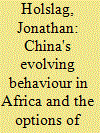

|
|
|
| 6 |
ID:
080719
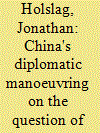

|
|
|
|
|
| Publication |
2008.
|
| Summary/Abstract |
This article assesses China's response to the violence in Darfur. Whereas the People's Republic had already been taking a constructive stance towards international interventions in various intra-state conflicts, the mayhem in Darfur compelled China to take the lead in engaging Khartoum. Beijing's engagement evolved from a rather passive posture, to taking a clear position, and finally, to active persuasion and mediation. During these negotiations, Beijing departed from the interests of the local political elite and tried to meet its concerns, not by imposing measures, but by clarifying the different options and creating trust to find a feasible consensus. From the Chinese perspective this approach was highly successful as it increased its moral influence, reassured its partners in Africa and the West, safeguarded its oil empire in Sudan and upheld its prerequisite of sovereignty and state consent
|
|
|
|
|
|
|
|
|
|
|
|
|
|
|
|
| 7 |
ID:
090489
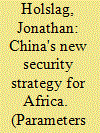

|
|
|
| 8 |
ID:
098857
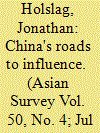

|
|
|
|
|
| Publication |
2010.
|
| Summary/Abstract |
This paper argues that although the People's Republic of China is promoting crossborder networks as a new regional common good, it is driven by both the fear of losing influence to other powers and the desire to create an open economic order in pursuit of Chinese interests. As in most forms of communication, it also appears in this case that the strongest player is best positioned to use these channels to its own advantage.
|
|
|
|
|
|
|
|
|
|
|
|
|
|
|
|
| 9 |
ID:
095394
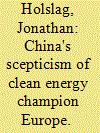

|
|
|
|
|
| Publication |
2010.
|
| Summary/Abstract |
While the EU has sought to gain both profit and "soft power" from increased cooperation with China in the field of clean energy, not much of this expectation has materialised. China is unwilling to recognise the European Union as the world's clean energy champion, and is itself trying to secure a larger part of the international market through green power. In this highly competitive sector, Europe should give up its soft power aspiration and should resort to a realist but constructive policy. On the one hand, it should impose more ambitious curbs on its emissions and use this as an incentive to boost its own green technologies. On the other hand, it should develop a two-track approach for its international cooperation: limited aid-based synergies with the least developed countries alongside pragmatic economic bartering with all emerging countries, not just China.
|
|
|
|
|
|
|
|
|
|
|
|
|
|
|
|
| 10 |
ID:
083220
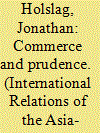

|
|
|
|
|
| Publication |
2008.
|
| Summary/Abstract |
This paper evaluates the extent to which China adapted its Africa policy to external criticism and expectations. It is found that policy modifications mainly occurred when long-term interests were at risk, with regard to issues of limited importance and non-binding initiatives. The article departs from the vast literature on adaptation and tests this concept on several aspects of China's engagement in Africa. This approach not only allows us to revise the PRC's changing Africa policy but also permits to contribute to the debate whether China is a status quo or revisionist power. In this regard, it turns out that China's ostensible compliance with the demands of other actors is designed to give leeway to its revisionist aspirations
|
|
|
|
|
|
|
|
|
|
|
|
|
|
|
|
| 11 |
ID:
186721
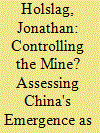

|
|
|
|
|
| Summary/Abstract |
The Chinese government has prioritized resource security and aims to increase its control over the minerals sector. China is a mining country, an investor in minerals abroad, and a key processor. Besides a few specific minerals, however, China has limited control and has not yet come to dominate the supply chains. A detailed examination of cobalt, manganese, and nickel, three minerals vital for various strategic industries, shows that Chinese mines deliver still only below 35 percent of Chinese demand. Much of Chinese processing capacity is tied to foreign industries in electric vehicles and so forth. While the ambition of resource security and control has been affirmed, it is not yet achieved.
|
|
|
|
|
|
|
|
|
|
|
|
|
|
|
|
| 12 |
ID:
090347
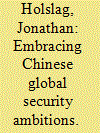

|
|
|
| 13 |
ID:
122013
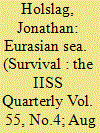

|
|
|
|
|
| Publication |
2013.
|
| Summary/Abstract |
Maritime disputes in Eastern Asia have been sending odd ripples of excitement through Western Europe for the past few years. Experts and policymakers claim that Europe cannot stay aloof. Some speculate that China might cut off trade routes in the event of a conflict and that Europe needs to collaborate with the United States to keep them open. A few go so far as to say that Europe's credibility as a security actor hinges upon the ability to send gunboats to the Pacific, and that it should build on the grand maritime tradition of member states such as the United Kingdom. Others assume that the European model of regional integration could be a way of settling the wrangling over the South China Sea. Maritime disputes in the East are, to be sure, a source of much uncertainty, and could escalate. But is this a reason for Europe to dive into the play pool of the Pacific powers?
|
|
|
|
|
|
|
|
|
|
|
|
|
|
|
|
| 14 |
ID:
145425
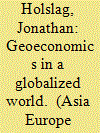

|
|
|
|
|
| Summary/Abstract |
This paper explains why and how China seeks to continue to promote export-driven industrialization. This way, it comes as a corrective to the widespread assumption that the Chinese government is readying to rebalance its growth from investment and export to more domestic consumption. But the paper also presents an important case of a largely geoeconomics strategy. What explains China’s quest for industry, it finds, is a quest for economic security, economic competitiveness, and more economic independence from large foreign suppliers of capital, brands, and knowhow. What characterizes the consequent policy, the paper goes on, is an increasingly more sophisticated push for exports. China’s aim in that regard is not to undermine the relatively open global market, but to bend the trade flows into its advantage by means of export credit, tax rebates, and so forth.
|
|
|
|
|
|
|
|
|
|
|
|
|
|
|
|
| 15 |
ID:
152542
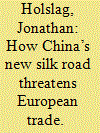

|
|
|
|
|
| Summary/Abstract |
For all the promises of mutually beneficial cooperation, Chinese policy documents about the New Silk Road, also called ‘One Belt, One Road’, mostly testify to a strong ambition to unlock foreign markets and support domestic firms in taking on foreign competitors. This confirms China’s shift from defensive mercantilism, which aims to protect the home market, towards offensive mercantilism, which seeks to gain market shares abroad. In a context of global economic stagnation, this comes as a major challenge to Europe. As China’s market share grows spectacularly in countries along the New Silk Road, key European member states have both lost market shares and even seen their exports shrink in absolute terms.
|
|
|
|
|
|
|
|
|
|
|
|
|
|
|
|
| 16 |
ID:
094159
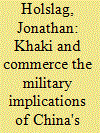

|
|
|
| 17 |
ID:
089905
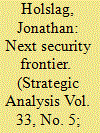

|
|
|
|
|
| Publication |
2009.
|
| Summary/Abstract |
This article explains how growing economic interests have made China and India more prone to various non-traditional security threats in their neighbourhood. It examines whether this evolution has led both countries to mitigate their struggle for influence in favour of security cooperation, and found that despite shared security interests, China and India are not able to overcome mutual distrust. The conclusions are that the quest for short-term gains impedes substantial security cooperation and that economic ambitions have added new impetus to the regional struggle for influence.
|
|
|
|
|
|
|
|
|
|
|
|
|
|
|
|
| 18 |
ID:
092949
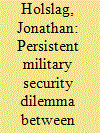

|
|
|
|
|
| Publication |
2009.
|
| Summary/Abstract |
This paper evaluates to what extent the improving Sino-Indian relations coincide with a mitigation of military threat perceptions. A critical review of the demilitarisation of the border, the military strategies with respect to the Indian Ocean and nuclear arms programmes, reveals that the two countries are still locked in a military security dilemma. Distrust still results in military balancing. The outcome is a complex and multi-level military balance of power that might not bring about peace but enhances stability.
|
|
|
|
|
|
|
|
|
|
|
|
|
|
|
|
| 19 |
ID:
087755
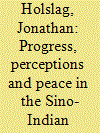

|
|
|
|
|
| Publication |
2009.
|
| Summary/Abstract |
The Chinese and Indian government are eager to intensify bilateral ties. This paper evaluates whether this enthusiasm has positively affected perceptions of the two societies in general, political actors and experts. A review of opinion polls, publications and official documents learned that this is not the case. Mutual perceptions are marked with ambivalence and distrust.
|
|
|
|
|
|
|
|
|
|
|
|
|
|
|
|
| 20 |
ID:
121099
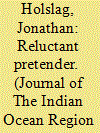

|
|
|
|
|
| Publication |
2013.
|
| Summary/Abstract |
This paper takes stock of China's evolving presence in the Indian Ocean. It posits that despite various traditional and non-traditional threats, the Indian Ocean is not the foremost concern in China's quest for maritime security. As a result, China's efforts to make foray beyond the Strait of Malacca remain limited. Three patterns in its posturing can be distinguished. First, it seeks to deter India - its main counterweight in South Asia - where it is the weakest, that is along the continental border. Second, it explores ways to reduce its reliance on the long maritime lifelines in the Indian Ocean. Third, it is gradually and modestly increasing its presence in a way that can be described as diffuse pervasion. There is thus no reason to be overly alarmed. Yet, important uncertainties remain over China's future intentions and the degree to which problems with lesser powers can prompt it to use military means to defend its interests. Future Chinese naval assertiveness in the region will more likely be the outcome of contingency than strategic provision.
|
|
|
|
|
|
|
|
|
|
|
|
|
|
|
|
|
|
|
|
|